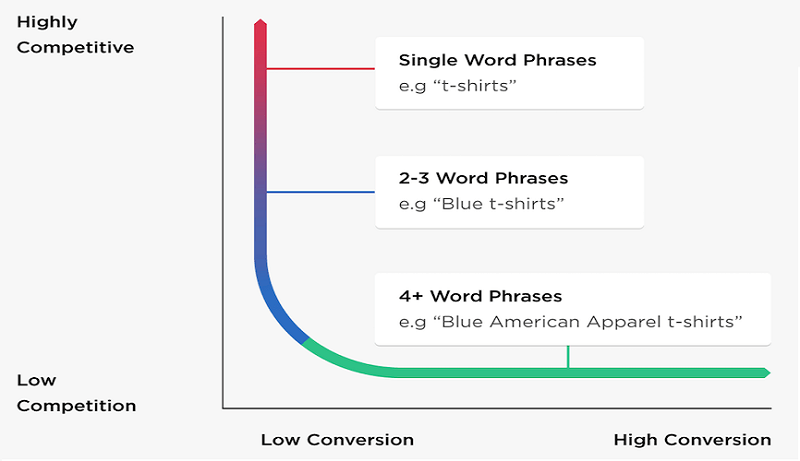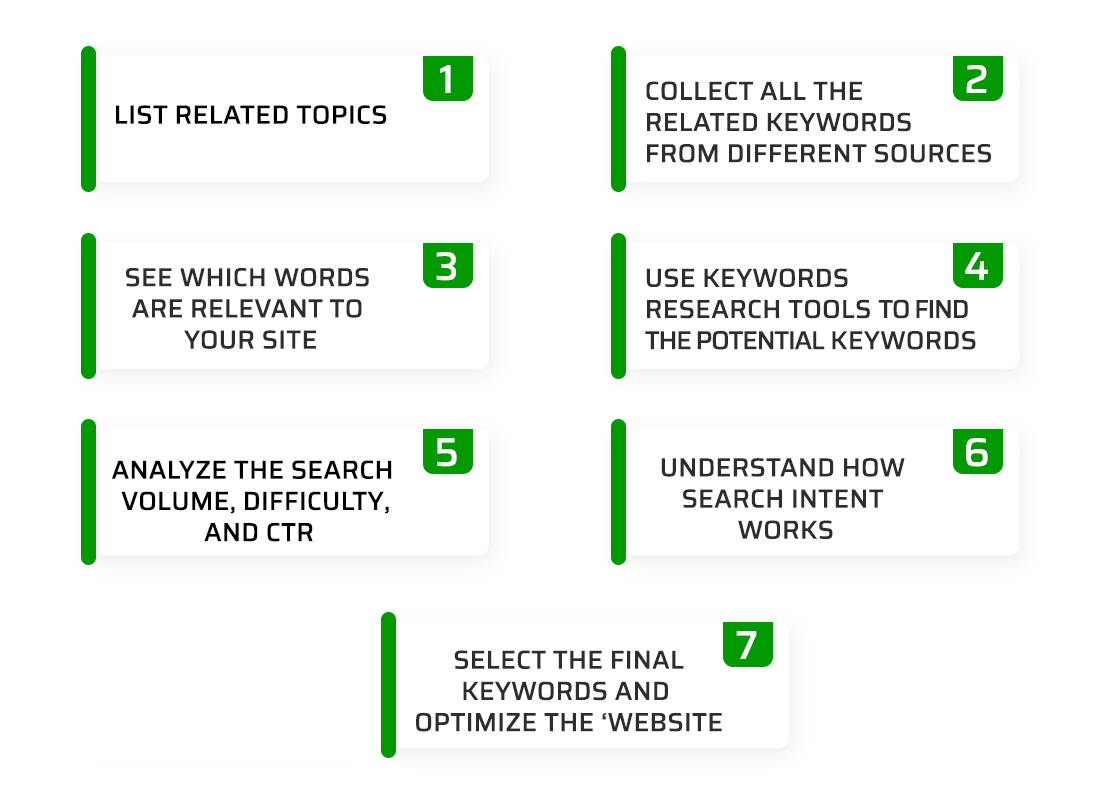Keyword Research for SEO: A Beginner’s Guide

Businesses, big or small, are now focusing more on establishing a robust online presence to reach their potential customers. This is because the internet provides a uniform platform to every establishment to garner substantial organic traffic, irrespective of their offline reach. It requires lesser investments, and the results are far better than what one would anticipate. The effort used to achieve a high amount of traffic online is called SEO (search engine optimization), and the most fundamental part of it is keywords.
Regardless of all advancements, every SEO strategy still begins with thorough keyword research. Did you know that even by updating your site’s existing title tags with proper keyword-optimized ones, you can increase its page click by more than 437%?
Take a look at this guide to know all you need about keyword research.
Importance of Keyword Research in SEO
There are three types of keywords you need to find before getting started with content marketing:
- Long-tail Keywords
Long-tail keywords are longer and more specific keywords that users are more likely to use when they’re closer to a point-of-purchase or when they are using the voice search. Generally, long-tail keywords have lower search volume than short-tail or “primary” keywords.
- Short-tail or Head Keywords
Short-tail keywords—also known as “head” keywords, broad keywords, or focus keywords— are search queries that are made up of no more than three words, and refer to very broad topics. This inherently makes “head” keywords popular, high-volume search terms.
- LSI keywords
LSI (Latent Semantic Indexing) keywords are conceptually related terms and phrases that search engines use to deeply understand the content/topic on a web page.

All of these have their own purposes, and only through proper research will you get to know which phrases are worthy of being a part of your content. Moreover, there are numerous possibilities of LSI for a particular topic. Through comprehensive research, you will get to know which words most of the high-ranking competitors use. Shortlist them.
Arbitrary incorporation of words will lead your pages to nowhere. But if you meticulously research and find out which words your target audience generally uses, you can easily feature quite high in their search results.
How to Choose Keywords for SEO?
Now that the importance of keywords in SEO is clear, the next pressing matter is following the correct way of conducting keyword research.
Going through a set path of steps is important because the words you choose will substantially change how your page performs on the SERPs. Elaborated below is an SEO keyword research strategy that you can follow:
Step 1: List Related Topics
The foremost thing to do is list generic topics related to your business where you want your web pages to rank. List about 5-10 topics that are either directly related or encompass the idea of your products and services. Then, create buckets of a few related topics which your website regularly discusses and use them in the future to find keywords specific to them.
You can also make buckets with topics that are most searched by your targeted audience. Then, you can use those to introduce your business to them. After listing all the topics that you can find, see which of these have the highest search volume and if it isn’t obvious, select the ones with the most moderate volumes.
Step 2: Collect All the Related Keywords from Different Sources
Once you have made enough buckets important for your business, the next task is filling these buckets with relevant keywords. Try to find as many words that are either directly describing your topics or have significant relevance to them.
For instance, in the case of a topic bucket for “Gaming software,” the probable keywords you will collect are:
- Gaming software
- Gaming software for PC
- Gaming software for students in college
- Design
- Gaming software download
- Xbox
- Animation
- Maya
- Best gaming software, etc.
As you can see, there are short phrases, long phrases, and words that are just related to the topic. You will find a lot of these phrases on the suggested searches in Google.

Step 3: See Which Words Are Relevant To Your Site
Once you have listed all the related words and phrases for the topic buckets, the next step is to filter them for your website. Let’s assume you own a company that sells gaming software. However, one cannot use that on Xbox, and students cannot afford it.
This means the keywords “gaming software for students in college” and “Xbox” are of no use to your website as they will only bring traffic that has the least chance of purchasing your product. Inspect the lists you have formed through keyword research for SEO and remove all the words that will add no value to your site.
Step 4: Use Keywords Research Tools To Find the Potential Keywords
If you find it difficult to go through different avenues to find the ideal phrases and words for your business, the internet has still got your back. There are several extremely efficient tools available in the market that will streamline your work significantly.
An SEO keyword research tool essentially asks for the topic you require, and it will provide you with a list of all the possible keywords for that. Along with that, you will get the required details about those phrases to ensure a better optimization process.
Step 5: Analyze the Search Volume, Difficulty, and CTR
The relevant information that you need to analyze is the search volume, how difficult they are to rank for, and if those words have a substantial CTR or not. A high search volume will mean a lot of people are searching with that phrase in their query, which implies using them will improve your exposure.
However, keywords with high search volumes often have excessive competition, thereby decreasing your chances of ranking well. So, your goal is to find words with a good amount of search volume but less competition. Lastly, a better CTR will ensure more people are visiting your page.
Step 6: Understand How Search Intent Works
As search engines are trying their very best to provide accurate search results, they keep introducing newer and stricter updates. At present, what decides your page’s ranking the most in “user intent.” So, if you consider writing content with a specific intent, you may rank high in that particular query.
Hence, while going through this SEO keyword research process, make sure you select the words that are tuned as per the search intent you want to target. Continuing with the previous example, “gaming software,” this topic can have several types of discussions, such as how to use one, or where to purchase one from, etc.
Step 7: Select the Final Keywords and Optimize the Website
Keeping in mind all the pointers discussed above in this SEO keyword research guide, select the final few you will be using in your content.
Assuming you already have a digital marketing strategy framed, develop content ideas best suited for your business around the words with the most search volume and add other similar words to support it on the SERPs.
Studies show about 69.7% of pages have keywords with more than four words (long-tail keywords). So, you, too, should try and use as many significant long phrases as possible. It will help you rank both on Google SERPs and for voice search. They also communicate search intent better, and it is best to use them naturally while framing the post.

Some Keyword Research Tools
While there are numerous tools available in the market, not all of them will provide you with proper statistics. Since CTR, search volume, etc., are dynamic values and are highly dependent on the behavior of the searchers, your keyword tool must provide you with current and accurate values.
So, here are some keyword planners that you can use to prepare your list:
- Google Keyword Planner
Every individual associated with content optimization uses Google Keyword Planner to filter their list from beginners to professionals. Though free, it is an incredible tool to use because it is a program developed by Google itself. Hence, the results you get are what the search engine deems ideal, and SEO is basically about doing exactly that.
- Keyword Surfer
While GKP is extremely popular, professionals use other advanced tools to get more precise statistics of their targeted phrases. Keyword Surfer is an ideal extension to use as it is also a free tool requiring no investment whatsoever. After you install it in Chrome, with every Google search you conduct, it will show you its CPC, visibility metrics, related terms, search volumes, and on-page data.
- Ubersuggest
Developed by SEO expert Neil Patel, Ubersuggest is another user-friendly tool for conducting keyword research for free. You will get an array of suggested phrases that can work ideally as secondary keywords. The tool offers you both global and region-specific keyword search volumes so you can make the correct selection according to your requirements.
- Ahrefs Keywords Explorer
If you want to know exactly how hard it will be to rank among the top ten search results for your targeted keyword, Aherfs Keywords Explorer is the best tool for that. It provides scores to the words of your choice ranging from 1-100.
- Semrush Keyword Magic Tool
The Keyword Magic Tool by SEMrush is designed to provide all the keywords and data in its database. With its help, you can determine which terms to use when creating a digital advertising campaign. Also, it will help you to know what keyword sets are better for website content marketing.
- Keyword Tool IO
Keyword Tool or keywordtool.io is another popular tool used by a lot of SEO experts. This is because it provides an extremely long list of suggestions covering almost every possibility. Moreover, you will get keywords not only for Google but other types of search engines as well.
Though these keyword research tools are exceptional at providing search metrics for almost every possible word and phrase, they are not 100% accurate.
Hence, use them only as an extra added help and do not base your entire research on them.
Advanced Keyword Research Tips and Strategies
Do not worry about the inaccuracy of the tools. Rather, take your research up another notch to meet the increasing competition. Use advanced keyword research strategies, like:
- Model Your Keyphrases From Pages and Sites That Have Ranked Fast
Understand if new pages and sites are ranking quickly for keywords with a high search volume, it means they are easy to rank for, and you should not miss the opportunity. So, a great way to get a similar ranking is by mimicking the phrases used in such pages and websites.
- Reverse-engineer the Poor Sites Which Should Not Rank
One of the most effective and hardly used SEO keyword research tips is reverse engineering weak websites that are ranking because there are no better pages to compete with. You will find several top-ranking pages which are absolutely not up to the mark. Find such ranking pages for your targeted topics and create better pages to capture that rank.
Conclusion
As a website owner, you should keep in mind that the very crux of your content marketing is keywords. So, you cannot take its research for granted. Thus, to conduct keyword research for SEO, a definite guide is necessary.
You can treat this as your guide to find the most suitable phrases and words for your topic. However, for the best services, you should opt for SEO keyword research services from a professional SEO agency.
Is there anything else that you’d like to add here?
Feel free to share your views in the comments section below.


